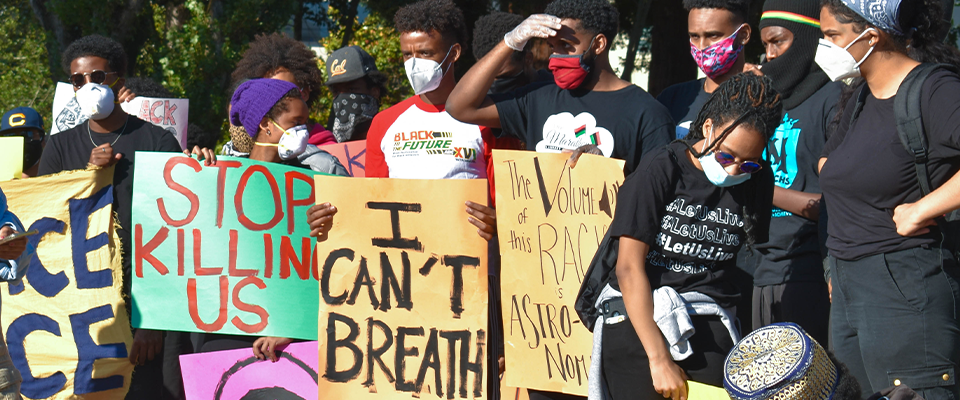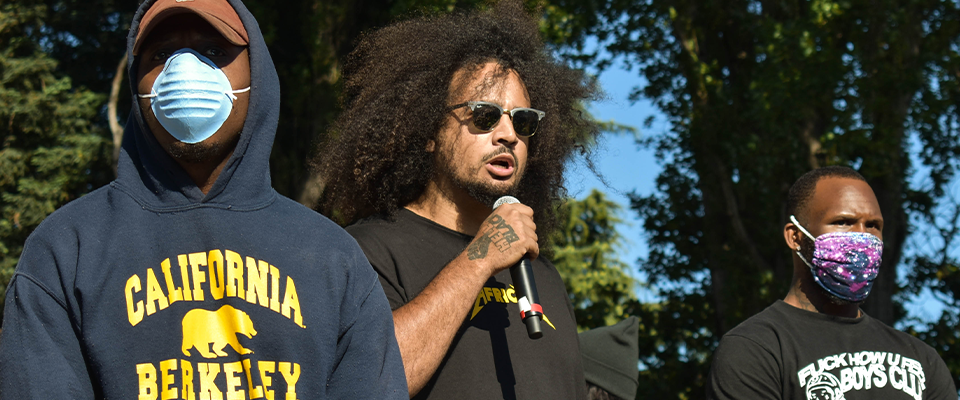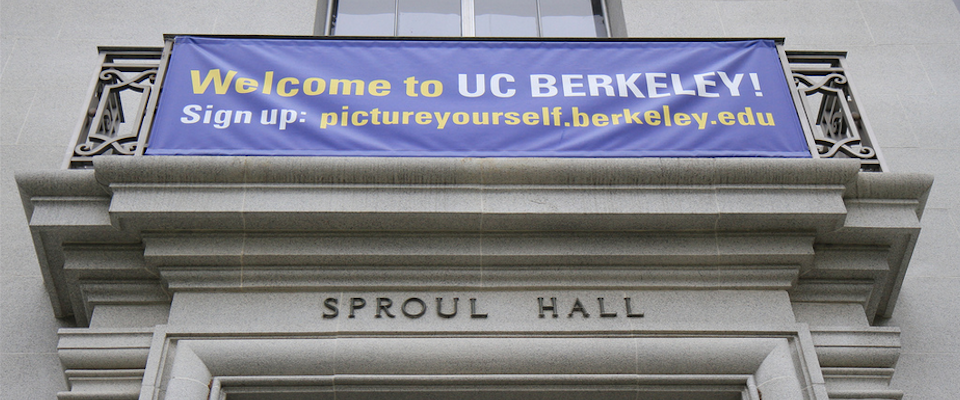In June 2019, University of California Police Department officers arrived at a playground near the UC Village, a campus housing complex for students with children and families. The officers had been called by two boys, both African American, who reported that an unfamiliar woman had been taking pictures of them. When officers arrived, according to news reports, they detained the boys—both children of UC Berkeley students—placing them in the back of a police car and handcuffing one 11-year-old boy after the woman accused them of stealing her purse earlier that day. (The woman’s purse had already been found and returned to her.) At a community meeting organized in response to the incident the following week, the boys’ parents spoke out: “My child lost his innocence, and I want somebody to be accountable for that.”
The incident was one of several instances of police violence cited in a demand letter sent to UC Berkeley Chancellor Carol Christ by the UC Berkeley Law Students of African Descent (LSAD) earlier this month. The letter, signed by 179 campus organizations and 2,468 individual students, faculty, and alumni, calls on the administration to cut ties with the Berkeley Police Department, to disarm UC Police Department (UCPD), and to disband the department and reallocate resources “to the development of appropriate alternatives to policing.” The letter comes as calls to defund police departments have gained momentum nationally.

“We recognize that police violence against Black people is not limited to Minneapolis or Louisville—it happens all over the country, including on the UC Berkeley campus and in our surrounding community,” the letter reads, referencing the recent police killings of George Floyd in Minneapolis and Breonna Taylor in Louisville, Kentucky, which have drawn national outrage. It continues: “By continuing to partner with Berkeley PD and fund UCPD, UC Berkeley plays an active role in this abusive system.”
Across the country, Black Americans are demanding that institutions—from public school districts, to public park districts, to museums—account for their roles in police violence. In higher education, the LSAD letter joins a growing chorus of students organizing against excessive and violent policing on university campuses. And it’s part of a long history of advocacy against police violence against Black people in Berkeley and on UC Berkeley’s campus—an institution, which, ironically, played a central role in the development of modern policing. August Vollmer, considered the “father of modern law enforcement,” was the Berkeley Police Department’s founding police chief. He also established the nation’s first school of criminology at Berkeley in the 1910s.
Not unlike some other university systems, the University of California operates its own network of campus police departments. UCPD has been operating as a state law enforcement agency since 1947, with the original department housed at Berkeley. During the 2019-2020 fiscal year, UCPD at Berkeley had a $15.7 million budget. According to reports from CalMatters, Berkeley’s law enforcement budget is the largest of the UC campuses, with more money spent on police salaries than on “instructors of education, psychology, or social welfare.” The department boasts a bomb squad and a crisis negotiations team “trained in special weapons and tactics” for use in situations “beyond the capabilities of general police personnel,” according to the department’s website.
The university police department also has a close working relationship with the city police. UCPD and Berkeley PD officers jointly police Telegraph Avenue—home to a range of shops and restaurants frequented by UC Berkeley students and faculty—nearby People’s Park, and the surrounding area. The campus contracts with BPD for support during large on-campus events.
The LSAD letter marks the latest chapter in this ongoing and UC-wide movement—one that aims to defund and dismantle, rather than reform, police.
Like policing itself, civil rights and anti-police advocacy, too, have a long history at Berkeley, beginning with the Black Panther-led protests of the late ’60s. In recent years, the campus has seen a resurgence in student advocacy against police violence. In response to the killing of Black 17-year-old Michael Brown in Ferguson, Missouri in 2014, the Black Student Union launched the #Ferguson2Cal campaign, calling attention to the connection between Brown’s killing and experiences they had had with police as Black Berkeley students.
In 2016, students pushed the university to pull UCPD out of Urban Shield, the first responder convention held annually in the Bay Area that, advocates argued, promoted police militarization. (Urban Shield ultimately ended in 2019 after the Alameda County Board of Supervisors voted to pull funding.) In 2017, after years of advocacy for greater transparency in policing on UC campuses from Black students and the ASUC, the university’s student government association, Berkeley launched an independent advisory board for “Police Accountability and Community Safety.” Since 2014, the ASUC has passed at least 10 resolutions related to policing on campus, according to Kerby Lynch, a graduate student member of the task force involved in anti-police violence organizing since she was an undergraduate. They include a 2017 resolution calling for limitation of police presence on campus after students protesting scheduled talks by racist, ultra-conservatives Milo Yiannopoulos and Steve Bannon faced a militarized response from campus and Berkeley police.
The LSAD letter marks the latest chapter in this ongoing and UC-wide movement––one that aims to defund and dismantle, rather than reform, police. Demands include reallocating funds currently spent on law enforcement to student support organizations like the Basic Needs Center, which works to ensure students have access to adequate food and housing, and the Health Opportunity Fund, which supports health care access on campus. The letter also calls for funding shifts to community organizations like the East Bay Community Law Center—a housing justice clinic in Berkeley—and the People’s Breakfast Oakland, which works to connect unhoused residents of West Oakland with food and shelter (both of which were founded by Berkeley alumni). As Maya Harmon, a rising third-year law student who spearheaded the letter, says, “Any type of organization that is meeting the basic needs of students and of the community, we think they can do a lot more with the funds because a lot of crime results from people’s social situation.”
Justin Brooks, also a rising third-year and collaborator on the LSAD letter, says he’d like to see some of UCPD’s budget reallocated to on-campus mental health services and consent education. Money could also be put towards economic development in the surrounding Berkeley community—for example, in People’s Park, where many unhoused people live and where, Brooks says, some have targeted Berkeley students. “They’re not committing crimes against students because they just want to,” he says. “They don’t have services. They’re poor. Why are we spending so much money on UCPD patrolling that area instead of helping those people?”
In a statement earlier this month in response to Floyd’s death, UCPD Berkeley chief Margo Bennett said there was “room for change” at UCPD, and that she would “continue to move our police department toward a better, more meaningful relationship with the communities we serve.” She did not, however, specify what next steps the department intends to take. Meanwhile, the Chancellor’s Independent Advisory Board plans to release recommendations for changes at UCPD this summer, according to Nikki Jones, a professor of African American Studies and member of the advisory board. The board has been working on the recommendations for nearly three months—beginning prior to Floyd’s death, says Jones.
“They don’t have services. They’re poor. Why are we spending so much money on UCPD patrolling that area instead of helping those people?”
In a statement on Thursday, UC Berkeley Chancellor Carol Christ said she heard “the pain, anger, exhaustion, and calls for accountability” shared by students and faculty in recent weeks. She outlined several changes the university would make in regard to police on campus, including examining what responsibilities currently housed within UCPD can be carried out by other university entities, creating a team of mental health professionals to respond to wellness calls instead of the police, and relocating UCPD’s headquarters from Sproul Hall, a major center of student activity on campus.
“In determining our actions,” Christ said of the university’s next steps, “we will work with members of the Black community, in particular Black students, to ensure that those in our community who are most affected by societal inequities, including structural racism and anti-Blackness, remain at the center of our conversations regarding police accountability and community safety.”
What’s next for student advocates?
“Holding [administration] to the fire,” says Brooks. That means showing up to UC budget hearings, he says, and, Harmon adds, working with the chancellor’s advisory board and other campus groups to pressure administration to act. “We recognize that this is going to be a process. It’s not going to all happen at the snap of a finger,” she says.
But after the events of the past several weeks, Brooks thinks the cat’s out of the bag. “I don’t think we’re going to see a retraction of the energy that we have.”
***Correction: The article has been updated to include reference to Kerby Lynch, a graduate student who was on the task force involved in the passing of anti-police violence resolutions on campus.




















